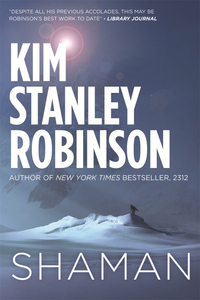You need to sign in or sign up before continuing.
Take a photo of a barcode or cover
I really enjoyed this read, it was a huge change from Robinson's other work in scifi, but it was surprisingly technical and very heavily detailed. The beginning drags on for a bit, but it gets its second (and third) wind about halfway through and I think that is where it shines.
Kim Stanley Robinson has written several books and series of books, each one of those would make any writer brilliantly famous. Each of those books is great and singularly different from the others. This book is no exception. From the development of characters, to what is never told in this wonderful paleo story, this book will leave most readers hungry for more. More stories and more knowledge. I read this book a little late with respect to its publication date, I've had it on my list, I have no idea why... This is an author I enjoy more than most, I should read his books immediately, even dropping whatever I am reading.
I enjoyed this! Basically it follows the life of an Ice Aged-era person in Europe, it's a fictional biography rather than following a set "adventure", but that adds to the charm. However, what detracts from the story (which is based on our best understanding of the lives of people in this era) is that it's not immediately obvious that it's trying to be factual, so it will likely just seem like an oddly descriptive pure fiction to readers that do not have any experience with anthroplogy. It's a pity, because this story really is a great insight into what life could have been like back then!
Another common critiscism of this book is the VERY sexual language used, particularly in the first third. It's a little jarring, but these are the stories of an adolescent, and I think it's done reasonably "honestly".
Spoiler
An example of this: At several points in the book, Loon, the protagonist, has encounters with Neanderthals that range from fleeing for his life to cooperation. The interactions between humans and Neanderthals go into quite a bit of detail, for example the Neanderthals' inability to speak in the human language, but their ability to mostly understand it. To someone that know nothing about NEanderthals, this could come across as simply a creative choice to make the "Old Ones" seem dumber and more barbaric, but in truth it's based on actualy studies on Neanerthal fossils and speculations on the sounds they were able to make. A reader needs a basic surface-livel knowledge to fully appreciate this.Another common critiscism of this book is the VERY sexual language used, particularly in the first third. It's a little jarring, but these are the stories of an adolescent, and I think it's done reasonably "honestly".
I'm rounding up to four stars. This was enjoyable enough, though tedious at times. Not profound for me. Probably my least favorite of his books I've read.
Not my favorite KSR book. Didn't have enough plot to keep my attention, though I appreciate the effort put into world-building.
I don't think I've ever read a KSR book that failed to take me deeply into another world. This one has a wonderful mix of the mundane and the eventful, all clearly imagined down to the last fascinating detail.
reflective
slow-paced
Plot or Character Driven:
Character
Strong character development:
Yes
Loveable characters:
Yes
Diverse cast of characters:
No
Flaws of characters a main focus:
No
I don’t like to rate books I don’t finish. Suffice to say, it was not up to my (admittedly high) expectations of Kim Stanley Robinson.
This is a story about life a long time ago, when people lived or died according to the seasons and the bounty of nature. People hunt animals and thank them for their sacrifice, fish, gather nuts and store everything they can for the winter--and even so, they get thin every year, and sometimes it seems like the hungry cold will carry them all away despite their planning.
The story centers around Loon, a shaman in training. It's not the job he wants--it was meant to go to his father, but he lost both his parents, and now he's the best choice. It begins with a vision quest, a step in becoming a Shaman, a dangerous trip where he is cast naked and without supplied into the winter night, to fend for himself until he is allowed to rejoin his tribe as a man.
Much of the story focuses on the harsh beauty of nature, on deprivation and the effort of feeding a group of people and keeping them safe. But Loon sees is all with a sort of wonder, and loves his life so much, that the story isn't dark, except in certain moments. It's quite interesting to think about how people lived then, and Loon's story comes alive with rich detail, heartbreak and triumph intermingled as in any life.
The story centers around Loon, a shaman in training. It's not the job he wants--it was meant to go to his father, but he lost both his parents, and now he's the best choice. It begins with a vision quest, a step in becoming a Shaman, a dangerous trip where he is cast naked and without supplied into the winter night, to fend for himself until he is allowed to rejoin his tribe as a man.
Much of the story focuses on the harsh beauty of nature, on deprivation and the effort of feeding a group of people and keeping them safe. But Loon sees is all with a sort of wonder, and loves his life so much, that the story isn't dark, except in certain moments. It's quite interesting to think about how people lived then, and Loon's story comes alive with rich detail, heartbreak and triumph intermingled as in any life.



